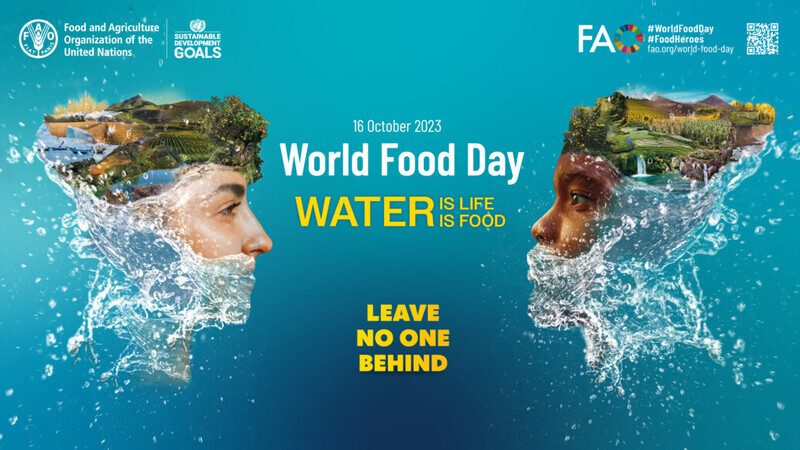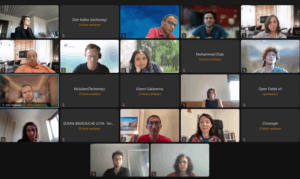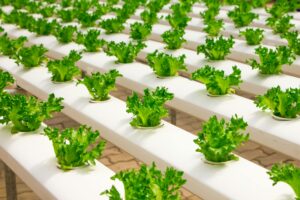16th October 2023 | As the world comes together to celebrate World Food Day (October 16th), it is essential to reflect on the critical role of water in our food systems. The theme of this year’s World Food Day, “Water is essential to life on Earth,” serves as a reminder that water is the lifeblood of our planet. It covers the majority of the Earth’s surface, comprises over 50% of our bodies, nourishes our crops, and sustains livelihoods around the world.
The way we produce food, manage our agricultural systems and consume resources all profoundly impact our water supply.
In addressing the intricate challenges of sustainable agriculture and water management, PRIMA plays an important role by highlighting the significance of the Water-Food Nexus.
Understanding the Water-Food Nexus
In the Mediterranean region, the Water-Food Nexus is of paramount importance, as the agricultural sector alone accounts for approximately 70% of all global freshwater withdrawals. What is more, in just two decades, 250 million people here will suffer water poverty due to droughts. The challenges are multifaceted, with competing demands for water among various sectors posing a crucial challenge. Addressing these challenges requires holistic solutions within the Nexus framework that aim to alleviate water pressure.
Rainfed agriculture in the Mediterranean region is providing around 60% of food production, but it is characterized by its heavy reliance on seasonal rainfall, as opposed to irrigation systems, to sustain crop production. This unique farming approach is deeply intertwined with the region’s climate, marked by hot, dry summers and mild, wet winters. While this method can be challenging due to the unpredictability of rainfall, it has been practiced for centuries, reflecting the resourcefulness of Mediterranean farmers.
Crops cultivated in rainfed systems include wheat, olives, grapes, and various fruits, with a strong emphasis on sustainable and efficient water management. In recent years, climate change has amplified the uncertainty of rainfall patterns, posing additional challenges to the already vulnerable sector. Thus, adopting innovative techniques and technologies to enhance water-use efficiency and adapt to changing conditions is crucial to ensure the resilience and productivity of rainfed agriculture in the Mediterranean region.
The rising trend of irrigation in the Mediterranean region due to water scarcity intensifies competition between sectors and raises concerns about pollution resulting from input usage. Here, the ecosystem component plays a pivotal role, highlighting the interconnectedness of water, energy, food, and the ecosystems.
PRIMA’s Commitment
PRIMA is committed to addressing the complex issues within the Water-Food -ecosysyems Nexus. We recognize the need for innovative solutions to safeguard water resources, ensure sustainable food production, and support the livelihoods of communities in the Mediterranean region.
Spotlight on three PRIMA projects
PRIMA’s advanced projects, including AWESOME and SIGMANEXUS or SUPROMED, are at the forefront of this endeavor. These projects operate at multiple scales, from the macro level, understanding global trends, to the micro level, exploring smart food production options.
A Look at the SUPROMED Project
The SUPROMED project strives to enhance the sustainability of Mediterranean agroecosystems, particularly in terms of water usage. It achieves this through an online platform equipped with models and methods that optimize input efficiency, including water, energy, fertilizers, and land.. Its user-friendly IT platform integrates advanced models and data to offer efficient water management solutions.
Farmers actively contributed to its development, and the platform is being adopted beyond the project’s scope (56 individual farmers were involved in the monitoring of 14 crops in 106 plots.). The results obtained at local level in Spain, Lebanon and Tunisia have being up-scaled to higher levels as a way to assess the impact of applying SUPROMED at larger scales. The socio-economic analysis was complemented by simulations for different climatic and economic scenarios.
The use of tools in different countries have permitted to reduce water use (25 – 28%) and increase the profitability between 10% and 21%.
More information: https://www.supromed.eu/index.php/en/
A Look at the AWESOME project
The project AWESOME has developed a methodology on convening the multi-actor working groups, along with a model of the WEFE Nexus at the micro and meso levels. The outputs of this mapping support the prioritization of the key ecosystem services that are currently under evaluation and their cross-reference with the catalogue of international policies on environmental protection. Also, they allow the elicitation of the key drivers of WEFE change that influence the modeling analyses.
At the micro level, the innovative technological solutions (i.e., hydroponics and aquaponics) have been demonstrated in the lab scale facility built in the suburbs of Cairo, Egypt, and the hydroponics experiments were evaluated.
At large scale, the macroeconomic models have been set up and calibrated: the CGE also included a sectoral representation of alternative water sources (e.g., reused, desalinated) for the macro-economic assessments influencing river dynamics.
More information: https://awesome-prima.eu/
A look at the SIGMANEXUS project
The SIGMA-Nexus is advancing beyond the current state-of-the-art in research, innovation and action. In research, SIGMA-Nexus contributes to economic, social and technical (including hydrological and ecological) aspects of both theoretical and applied research on resilient and productive agro-ecosystems (3 demonstrations sites in Egypt and Greece). In innovation, by designing and supporting the innovation digital portal, it will strengthen cross-sectoral communication, improve coordination between research and policymaking, and support scalability and technology diffusion. In action, a training program and participatory multi-stakeholder workshop facilitates innovation adoption and uptake of best WEF Nexus practices.
More information: https://sigma-nexus.eu/
On this World Food Day, PRIMA emphasizes the pivotal role of water in our food systems and underscores the importance of the Water-Food Nexus. PRIMA is dedicated to pioneering solutions that harmonize water conservation, sustainable agriculture, and environmental stewardship. Together, we can create a future where no one is left behind in our pursuit of a resilient and thriving Mediterranean region.




